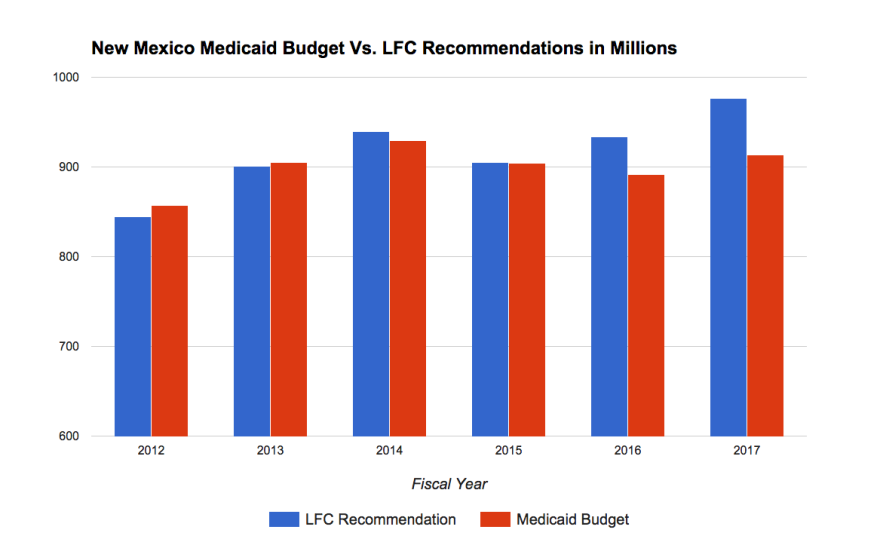The Legislature found more money for health care this year than it did last year, but it’s still not enough to cover the costs of Medicaid expansion under the Affordable Care Act. A group of advocates and associations from all corners of the health care system met on Friday to grapple with the projected shortfall.
Medicaid in New Mexico is facing a huge deficit—$80 million in the next two years balloons into as much as $400 million when you consider federal matching funds. A surprisingly large audience turned up to watch the Medicaid Advisory Committee try and figure out what happens next.
Members of the public urged the committee to cut other things first, things like administrative fat. They said the state needs to raise more revenues and get creative about how to do it.
"I think it would be tragic to move forward and only look at cuts. To begin the discussion by saying there’s only one way out of this is just really shortsighted," commenter Bill Jordan said. "You all are about to make really serious decisions that are going to impact the health of people in the state and the economy of the state."
So why is New Mexico coming up short? Well, the feds are rolling off their support for Medicaid expansion gradually year by year. And oil and gas revenue tanked last year, which meant less money for everything. Plus, way more people are making use of Medicaid.

Lisa Rossignol is with Parents Reaching Out in Albuquerque and works with families who have kids with special health care needs. She said she just started to see the full positive impact of Medicaid expansion.
"The out-of-pocket costs the families are having to pay for medical necessities is reduced," she said, "and those families are actually being able to use that money then to pay bills that they couldn’t pay before or to be engaged in the community, go to the zoo … ."
Rossignol said it was alarming during the meeting to hear what was being proposed—reducing what Medicaid covers or decreasing rates paid to health care providers. "We were just talking about cutting," she said. "And we’re not even where we need to be with some of the Medicaid benefits, right?"
The shortfall, she said, is epic, but she says the state needs to find more money somewhere—whether it’s through taxes or something else—to make it work. "We have to look at revenue to fund our health care. It’s a civil right, and the people that don’t get it, tend to be of a disparate population."
Human Services Secretary Brent Earnest said he knows Medicaid expansion under the Affordable Care Act has helped many New Mexicans.
"We’ve had more than, you know, 250,000 people come onto the program since 2014. And it’s higher-than-expected enrollment," he said. "Certainly it’s a benefit to many people, and we recognize that and want to be sure it’s available going forward."
And he said no one group—patients or providers—should shoulder the burden alone. "You can’t reduce rates so much that it’s going to impact the ability of a provider to provide services, and so we have to evaluate that, too, as we go forward."
Earnest said the department has to make some decisions pretty quickly, because the start of the fiscal year—July 1— is right around the corner.

Kyra Ochoa said when big cuts happen, the difference is just made up somewhere else. She’s with Santa Fe County’s Community Services Department.
"We at the county level are responsible for indigent care no matter what," she said. "We are responsible when people don’t have insurance, and we have to pay. And it costs the counties a lot."
Ochoa said counties are in touch with their communities, and that’s why they need a seat at the table. "We don’t want to go back to where we were, where we knew people who’d never been in a health system. For 40 years, they’d never seen a doctor, had untreated diabetes, had end-stage heart disease," she said. "And we want to catch people a lot farther upstream."
In the coming weeks, officials will be quickly weighing the needs of New Mexicans and the promises that were made under the Affordable Care Act against the realities of the shortfall.
*****
Public Health New Mexico is funded by the Con Alma Health Foundation and the W.K. Kellogg Foundation.







